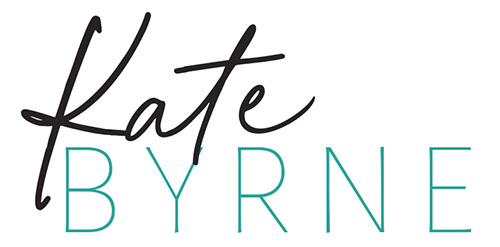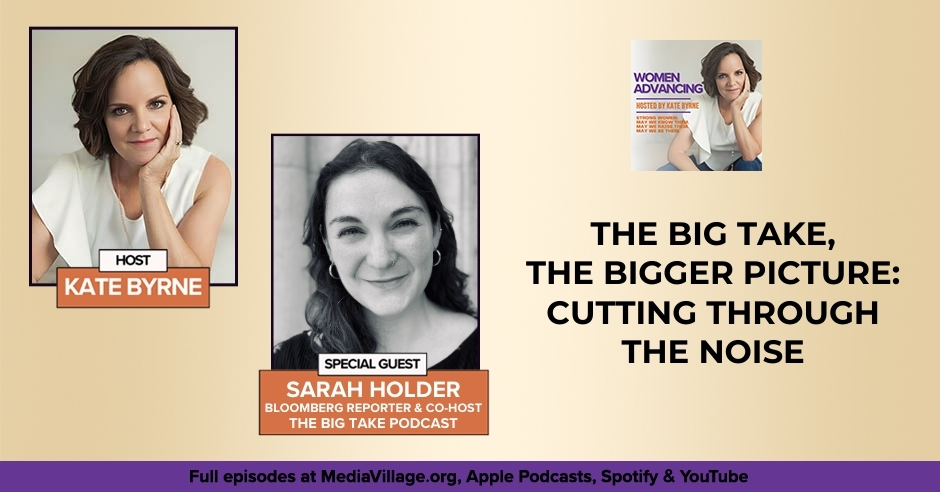
The future of journalism is evolving fast, and Sarah Holder is helping shape it. As a Bloomberg reporter and co-host of The Big Take podcast, Sarah shares her journey from internships at Politico and CityLab to covering global forces that impact our daily lives. She offers practical tips for navigating today’s news landscape—like which sources to trust and why audio storytelling matters—while reflecting on the responsibility and privilege of journalism. From debunking the myth of apathetic youth to exploring diversity and AI in the newsroom, Sarah brings clarity to a noisy media world and hope for the future of informed storytelling.
—
Watch the episode here
Listen to the podcast here
The Big Take, The Bigger Picture: Bloomberg Reporter And Co-Host Of The Big Take Podcast, Sarah Holder On Cutting Through The Noise
A Look At The Local Roots Of National Change And Making Sense Of A Complex World
What happens when one of the freshest voices in journalism takes the mic, literally? We’re about to find out because in this episode of the show, I get to sit down and talk with Sarah Holder. She’s the former CityLab standout, Bloomberg News reporter, and one of the co-hosts of Bloomberg’s The Big Take podcast. We talk about shifting mediums, shaping narratives, and showing up with clarity in a crowded and way too often still crusty media landscape.
We’re going to get into what it’s like to cover housing, politics, and housing policies that empower a young woman in journalism, how podcasting has changed the way she connects with audiences, and why storytelling still has potential to move the needle if we’re brave enough to tell the truth and loud enough to be heard.
Whether you’re in the newsroom or trying to be heard in the boardroom, in your company hallway, or even in your own home, this is a masterclass in voice, vision, and staying rooted when the ground around you keeps shifting. We all know there’s a lot of that going on. Enjoy. Be sure to say to the end because I got a few takeaways to share.
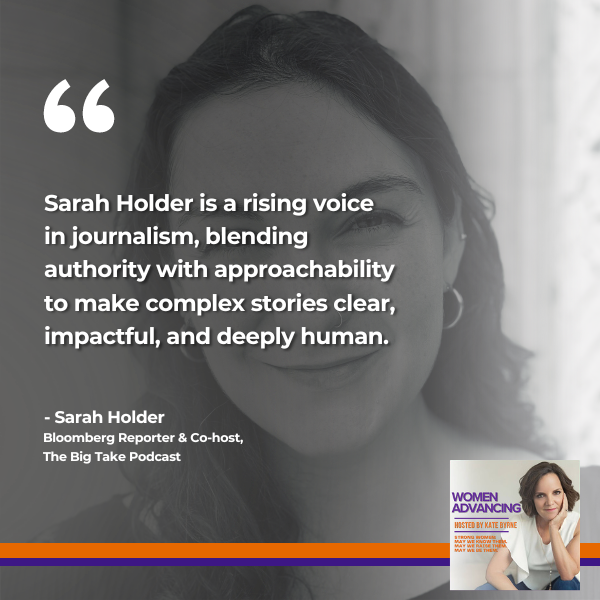
You are in for such a treat. I am joined by Sarah Holder, who’s the Bloomberg News reporter and co-host of Bloomberg’s The Big Take podcast, one of the up-and-coming voices of news media of her generation. Sarah, thank you so much for making the time for us.
It’s so fun to be here. I’m so glad to be talking to you and talking to one of my favorite hosts.
From CityLab To Bloomberg: A Journalist’s Evolution
I’ve known Sarah for a bit. It’s been fabulous to watch her blossom, grow, and do everything that we talk about every week, which is stepping in and owning her voice and her power. We’re going to do a little dive and see how she did it, but also what she sees out there on the horizon, and what it’s like being a young woman’s voice in this world, which we’ll get into in a little bit. Let’s dive into that personal journey. Think about this. You’ve worked at amazing places, like The Atlantic and Bloomberg Businessweek. How did you get to where you are?
I’ve always wanted to be a journalist. I’ve always been so curious. I’ve loved asking people questions. I’ve loved writing. In college, that was my whole life. I was editing for the weekly newspaper. I was writing for all the magazines I could. I was freelancing for little environmental magazines in New Haven. It was my dream and my passion to pursue a journalism career.
After college, I had a brief internship at Politico, covering the first Trump term. I started out at Politico in Washington, DC, but I also had this fellowship at The Atlantic to work at CityLab. CityLab was like a dream home for me at the beginning of my career because I was interested in housing policy, urban policy, and how cities work. CityLab was housed at the Atlantic, and it was doing all of those things and more. I got to learn a lot from a small team of dedicated journalists at CityLab. That was my journalistic home for years, and where I learned everything I know.
It’s true. When you go to different houses, as we call them in the media realms, it does impact one’s lenses. They’ll filter through which we see things. I know you did some extraordinary work at CityLab. Here you are, doing The Big Take. How has your perspective as a younger journalist shaped the stories that you tell and how they’re being received?
It’s so interesting. At CityLab, our focus was to look at localities and local stories, understanding their national implications, and looking at cities as laboratories for experimentation, policymaking, and activism. At The Big Take, I am a host of a daily news podcast that’s global in reach. It reaches everyone in the Bloomberg news ecosystem. I’m talking to people in China, Iran, and London, and reaching people in those countries as well.
The focus is much more global in scope. I’m trying to make people in their local cities understand how to make sense of the world and its relevance. It’s the opposite. I’m doing the opposite in my host chair. It has been rewarding, especially in an insane time for news to be waking up every day, reading the headlines, and then being a part of deciphering them and helping people break them down. That has been a rewarding transition, but sometimes, it can be intimidating to have to understand the global geopolitical dimensions of a war in the Middle East when a couple of years ago, I would probably have been writing about the New York City Mayor’s race.
Global Connections: The Bacon, Egg, And Cheese Economy
When I was at Businessweek, one of the best and most important things about Businessweek was that it had such a gift. This is also before Bloomberg bought it, so we’re talking ancient times. I can remember the then-editor-in-chief, Steve Shepard, explaining to me why the fall of the Mexican Peso was eventually going to hit me in San Francisco at the time and why it all mattered. Has there been anything you’ve noticed as you hear these global stories? Instead of localized, smaller cities, you’re working with big ones. Are there any commonalities? Is the world smaller than we think or more alike than we think?
That’s a beautiful question. We are more alike than we think. We’re all connected by these global forces in ways that I didn’t understand. We did this fun episode for The Big Take with my colleague producer, Julia Press, on the bacon, egg, and cheese sandwich. It’s a New York City breakfast sandwich staple, and it’s getting much more expensive.
Inflation is impacting the bacon, egg, and cheese sandwich, but it’s not just inflation. It’s the drought in Brazil. It’s supply chain disruptions. It’s bird flu. It’s tariff policy. It’s everything combined in this one silly sandwich item. We are able to trace the supply chain of the products that go into a bacon, egg, and cheese sandwich from all over the world and help listeners understand why something that used to cost you $4 now costs you $6.
It's actually very useful in the job of a podcast host to have a bit more naivete and an openness to learning. Share on XThere are so many global capitalist forces that go into one breakfast item. I feel like that’s what we’re trying to do every day on The Big Take. We are like, “You wake up in the morning, and you buy something at your coffee shop. You need to know a lot about international trade policy to understand the significance of that.”
Mastering Media: Navigating The News Landscape
You mentioned something earlier about deciphering the different headlines. I talked with Amy Bernstein over at HBR about this. It’s this whole notion of critical thinking, critical thought, and, to your point, discernment. Are there tips, or do you have suggestions for people? On the one hand, there are old traditional schools, and then there are all sorts of new schools of news sources. What is a listener, watcher, or viewer to do?
There is a lot of news out there, which is only a good thing. More voices in the space are better. We’ve also seen a lot of publications closed down. I would always be like, “More,” especially on the local news side. What I do is I listen to my daily diet of daily news podcasts, like The Daily, The Journal, and NPR. I also subscribe to newsletters of writers that I admire and have followed their work for a long time. You get the personal touch of being in connection with writers whose work you trust and respect, and whose analysis makes sense. Sadly, I have to be on social media a lot for my job, which helps me understand what people are talking about and how they’re processing headlines.
I also read a lot of local news. When I was living in San Francisco, I was reading the San Francisco Chronicle every day and some of the newer upstarts, like the San Francisco Standard and SF Weekly. When I was in DC, I subscribed to 730DC, which is a local newsletter with a very community-minded approach. Now that I’m in New York, there is a huge network of local news startups along with The New York Times. There’s Hell Ga and THE CITY. I try to keep abreast of what’s going on locally there. Pick your buckets. There’s the national, local, and then the social community-based news. That helps me.
Take a peek. With that all being said, here you are, walking into these spaces and holding conversations that are pretty much still dominated by traditional voices. You’re breaking in and, as I mentioned in my intro, blossoming. You truly are. It’s fun. Thank you for everything that you’re doing.
I appreciate that.
How do you balance authority and approachability? I could see how it could be easy to be underestimated while wanting to demonstrate authority, but not be too bossy best.
It’s an interesting question. It’s a hard line to toe. What’s great about the podcast that I’m on is that I often have to be a proxy for the listener. As a journalist, all I do is ask questions. If I don’t know the answer to something, the useful path forward is to ask it because perhaps someone else listening doesn’t know it either. I also have an amazing team of people around me that help me get prepped and read-in on issues that I might not know much about last week, but now, I could tell you where the price of Brent Crude oil is this week, or the latest in ceasefire negotiations in Iran and the Middle East.
Bringing that authority and that level of research to the conversations allows me to ask both curious, open, and well-researched and knowledgeable questions. It’s very useful in the job of a podcast host to have a little bit more naivete and openness to learning and being told I’m wrong while still doing so much research and making sure I get nothing wrong.
Crossing Ts and dotting Is.
I’m bringing that journalistic rigor, ethics, and attention to detail before the conversations and after the conversations so that people can’t say I can’t do this as well as anyone else.
I know that you started off in print and then shifted over to podcasting and digital, in general. A question for you. Is there any difference in the connection by voice and this sort of interaction versus, “I’m writing it. I met my deadline. Onward I go.”
I’m curious for you to answer this as well for yourself. One of the reasons I wanted to move into the audio space is in part because I was having all these wonderful conversations with my sources. I was hearing their stories in their own words, paraphrasing them, quoting them in my pieces, and adding my own context. I thought there was so much value in hearing a person tell their own story in their own words. It was exciting for me to have the opportunity to do that.
There's so much value in just hearing a person tell their own story, in their own words. Share on XThe connection with sources is one part of it, and then there’s the connection with listeners. There are different audiences and different listeners who are able, ready, and excited to listen to a 15-minute podcast episode about an in-depth topic versus reading a 3,000-word piece that I worked on for 6 months. Sometimes, you’re not going to reach people in the written medium. That was also very exciting to have the opportunity to reach new people in new ways.
The reason why I love podcasting conversations is, one, I’m curious about people, in general. Two, and it goes back to the earlier question I mentioned, everyone has got similar stories. There are so many people watching, like my girls, as they’re getting out of college, and then sitting there and thinking, “I’ve got to get the perfect job. If I don’t get it right out of the gate, there goes my life and my career. I’m so unlucky because I don’t know exactly what I want to do.”
The truth of the matter is, extraordinary people had no freaking clue, and how often people fall sideways into jobs and careers that take them in different ways. It’s to let everybody know, “You’re exactly where you’re supposed to be. You’re going to figure it out because what you’re going to do doesn’t even exist right now.”
Beyond The Resume: Finding Your Career Compass
This may be a tangent, but on the topic of finding your way, there was something I did before applying to this job. I was confused about where I wanted to go in journalism. I had been working at CitiLab for 5 or 6 years. I loved it. I loved my editors. I felt so fulfilled, but I was interested in a new challenge. I went to a person called the decision coach, and I talked to her about career, aspirations, and opportunities.
What she encouraged me to do was to write a list of values and adjectives you would want in your next job. That was helpful. It wasn’t like, “I need to get the best new job.” It wasn’t about where I would work or what actual job I would do. It was more about how the work would make me feel, what kind of people I would want to work with, and what kind of output I would want to put into the world. That was a helpful framework for thinking about what should come next for me.
That is fantastic. As you’ve gotten more and more comfortable and increased your span of influence, was there one particular moment where, because of your reporting, there was a change sparked or a shift in the conversation? I can imagine for either one, but especially maybe CitiLabs days, or even now. What was that? What did it feel like, speaking of feelings?
One of the stories I did a couple of years ago that I spent a long time on and felt strongly about was the story about homeowners’ associations in Colorado and their power to foreclose upon residents over unpaid fines and fees. I spoke to one family who was being evicted from their home that they’d lived in for many years by their homeowners’ association.
I learned a lot about the powers that homeowners’ associations have in the United States. I did a lot of research on their history. I got to know this family in Colorado. After my piece was published, about a year later, and I don’t know that my piece specifically had anything to do with this, but they were told by a judge that they could stay in their home and that their fight was over.
That’s awesome.
It was heartening to have followed their journey for so long, knowing how hard they were fighting, and to see it through to the end. The fact that their lawyer reached out and sent me the update on the case was useful. Another piece I wrote with a colleague or a couple of colleagues at Bloomberg was about the NYPD’s Police Chase Policy and how they were engaging in sometimes very dangerous pursuits of suspects with cars.
They often lead to bad outcomes. It was leading to people, civilians, pedestrians, and the people they were pursuing getting hurt. There was a lot of local coverage of this issue at the time. The NYPD changed its pursuit policy to be a little bit more in line with best practices. It’s hard to prove one-to-one influence, but a lot of the best practices that we talk to experts about were then adopted by the NYPD.
That’s huge. Congratulations, regardless of whichever. That’s fantastic.
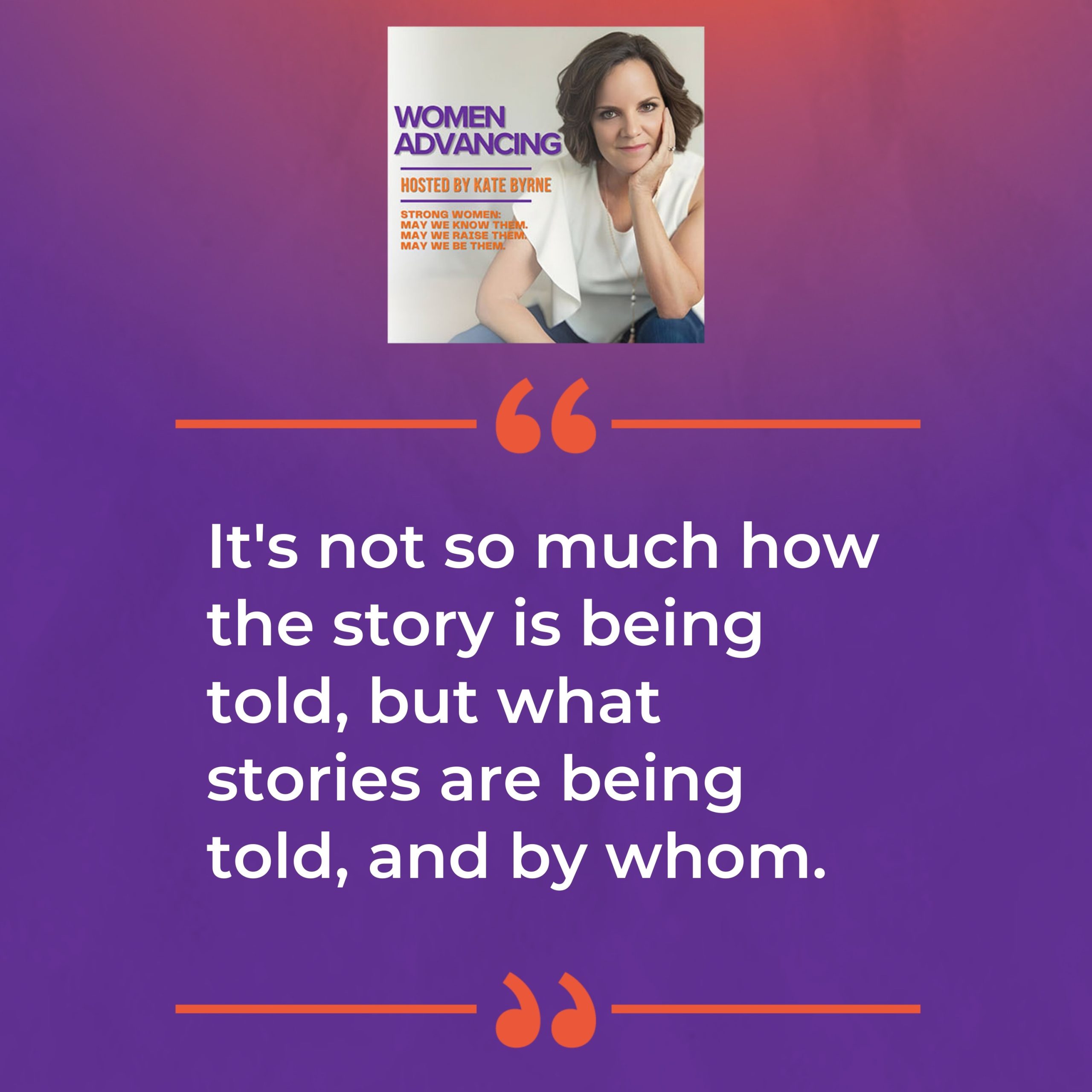
Thank you. I wrote that with my colleagues Fola Akinnibi and Kendall Taggart. I want to give them a shout-out.
What’s a narrative about young people or young cities, like up-and-coming cities, that you’re so tired of hearing? What’s a more accurate story underneath it?
I don’t know if this is still the narrative, but thinking about apathy among younger generations. We’ve seen in protest movements over the past few years with the New York City mayoral election that a lot of young people are getting excited about. We’re not apathetic at all. Young people are so excited and engaged in politics. Young people are also pretty disillusioned with the leadership, perhaps rightly, in a lot of situations.
Especially in my work at CitiLab, I talk to a lot of activists and advocates who are out every day, either in the streets or in service positions, working with tenants who have been evicted from their homes or working with folks who are on food stamps. A lot of the people who are doing the work on the ground to support community members are young people. I think of my friends who are government researchers, public health experts, and are training to be lawyers. I see a lot of energy, optimism, and on-the-ground grit from our generation. That is very exciting to me.
The Future Is Local: Hope For Community Journalism
It’s exciting to me, too, because we are counting on you. Please. Building on that and this notion of giving a voice or mic platform to the people within a community, what’s your take on the future of local journalism and civic storytelling? You all are, but aside from you all, are there models that give you hope that you think are nailing it or are interesting?
Yeah. I mentioned some of the local news sources that I relied on in each city that I lived in. New York has an interesting local news ecosystem where there are some worker-owned collectives like Hell Gate New York. There’s nonprofit reader-supported journalism like THE CITY that does great investigations, and then things like 730DC in Washington, DC. It’s like a newsletter that tells you the news of the day. It sprinkles in some events. It gets people off their computers and into the community with each other. It builds a reader ecosystem around the product. All of those are exciting. The Baltimore Banner is another nonprofit news model that erupted in Baltimore. I read a lot of this news a lot, and I am excited by the potential model that it represents.
That’s something to take note of. I had spent a little bit of time over at the San Francisco Chronicle when I was living in the Bay Area. It is sad when local newspapers no longer cease to exist. However, don’t give up hope because there is such a great upcropping of the next generation and different outlets. It’s all still there. It just won’t look as standardized as we had become accustomed to.
Another thing for the younger generation is that I’m seeing a lot of friends and colleagues start their own things. I’m sure so many people on your show have talked about Substack and newsletters. My partner has a Substack. It has been such an amazing way for him to connect with readers. There’s a vibrant comment section. He’s able to send people stories that otherwise would be behind a paywall and get the pulse of what people are talking about. There’s clearly such a vibrant community of people who are obsessed with somewhat niche topics on Substack, and that’s exciting. People are craving that. There are ways to get paid for that work, too.
Women In Media: Diversifying Voices In News
The thing that I think about that, too, when everything shifted from print over to the websites, everyone thought, “Great. There’s the editor in chief of days gone by up in the ivory tower. Now, you’ll be communicating back and forth all the time.” It has become the next generation of an ivory tower, but this one’s digital. We’re looking at what can happen next and what takes place next, which is cool.
Speaking of what happens next, more women, it seems to me, are stepping up and taking the helm of major news and media houses. Also, let’s face it. Even on TV, there are a lot of interesting young voices taking over for CNN, for the broadcast, and all that. Will there be an impact on the stories being told, do you think, or the lens or the angle through which they’re told?
I’m so lucky to have always had women editors. I love my male editors as well, but a lot of my bosses over the years have been women. It has been wonderful to get to work with women and be supported by women mentors throughout my career. I’ve been a beneficiary of having women in the media, which I appreciate. At Bloomberg, there are a lot of women who are elevated into positions of leadership and power.
I don’t know how different the coverage is, but in general, a diversity of voices is important. Age, race, gender, economic diversity, etc., always bring a richer pool of stories to the table. It’s not just how stories are told. It’s what stories are told. I know a lot of your guests have spoken about that, too. The most important thing is who is pitching the stories and who is thinking about the kinds of sources we’re calling up, even more than how those stories are written. It’s something I think about on the podcast as well, having gender diversity and geographic diversity in the voices that are speaking on these topics.
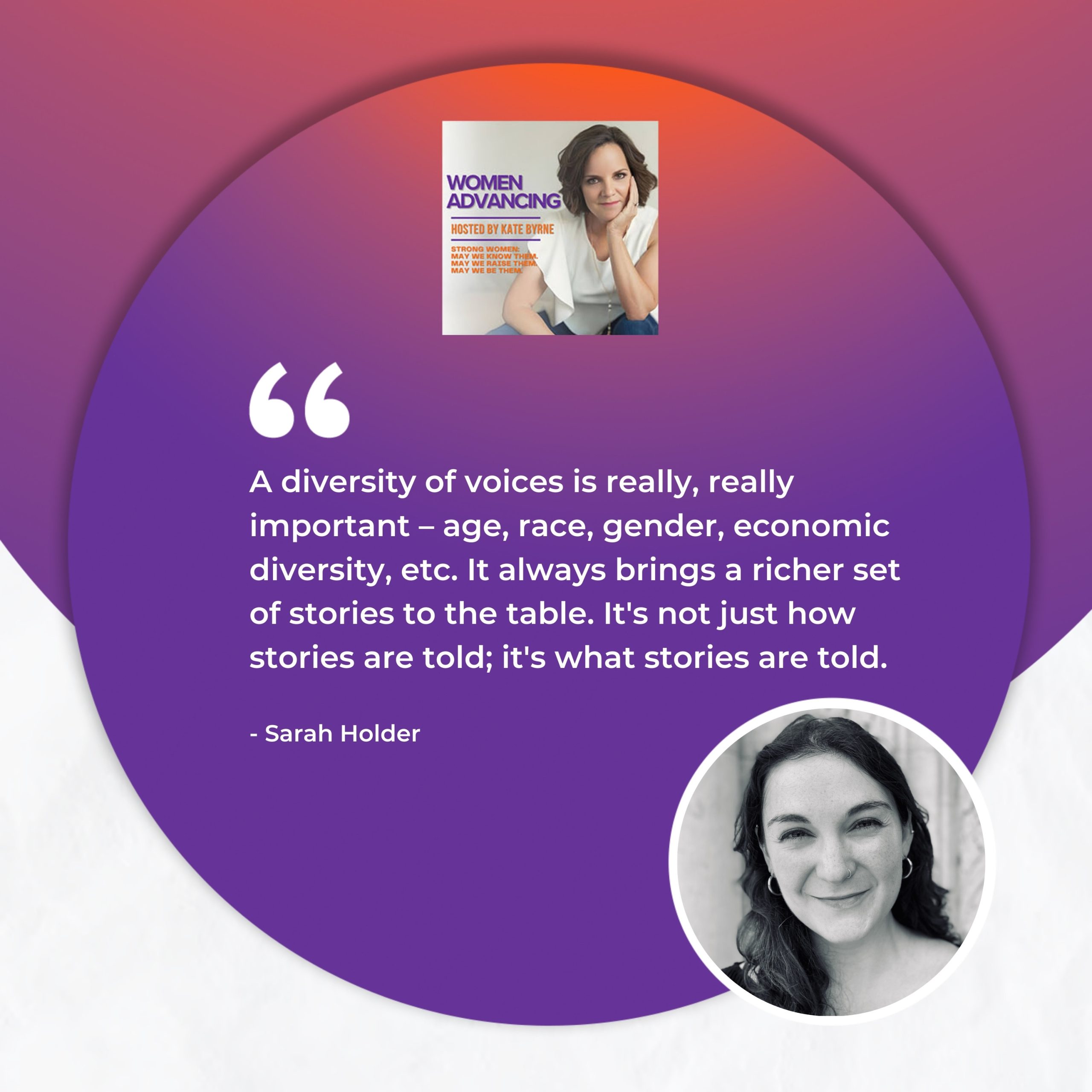
The AI Frontier: Navigating Bots In The Newsroom
I’ve finished spending a ton of time talking about AI bots. I volunteer and teach intentional leadership at a small two-week bootcamp. I’m teaching AI to high school kids. One thing I posed to them was, “One day, you’re going to have to lead. You’ll have an intergenerational team, but what are you going to do when you have bots?” It’s a weird thought, but it also makes me wonder. People are so afraid of AI interspersing itself within what’s real and what’s fake in content and news. We can all tell when you’re on YouTube and which pieces are actual. It makes me wonder what’s going to happen later on. One day, will there ever be a bot who becomes the editor-in-chief? I think perhaps not.
Some newsrooms are experimenting a lot with AI. I know Bloomberg is. I have been a little wary of touching it. We have AI summaries of a lot of articles and research. I know we’re being encouraged to use it responsibly and carefully. I’m like, “Maybe later.” It’s something that newsrooms are experimenting with, for better or for worse. There are also a lot of mistakes that are made and hallucinations. I feel like, with trust in news already so low in some areas, you don’t want to mess it up with a robot making a mistake. If it makes things faster and clearer, I’m open to it.
I always close with this. It’ll be particularly interesting to hear your answer to this question. Knowing what your wise self knows now, what advice would you give your younger self, knowing what you know now?
The advice I’d give myself is, “Don’t be so hard on yourself. You’re doing something important. People are listening to you. People are reading you. Hold that responsibility carefully.” Looking back, I didn’t realize I was 22 years old, writing articles for The Atlantic, for CityLab, and for Politico Magazine. That’s a huge responsibility and a huge privilege. I realize how little I knew then when I was writing those articles.
Don't be so hard on yourself. You're doing something important. People are listening, people are reading. Hold that responsibility carefully. Share on XIsn’t it funny the responsibility that we’re given?
Yeah. What I did back then and what I still do now is talk to a lot of people, hear a lot of different perspectives, and be ready to change my mind, evolve, and grow as a journalist. In hindsight, I realized how lucky I’ve been to have the career in journalism that I’ve had and hold on to every day.
What advice would you give to folks who are trying to get into it? Are there any secret agent ways?
I wrote so much. I was looking back at some of the stuff that I wrote in college. I was volunteering for random nonprofits to write articles about their events. I was writing 4,000-word articles a night for our weekly paper. Try to get as many bylines as you can, and try to find a focus. I benefited from diving into housing policy and urban policy.
You did. That was a nuanced niche. That was very smart and so incredibly relevant. It has grown in its relevance.
I was at Politico during that first Trump era. It was an exciting time to be there. I learned so much from the people around me. I was writing about issues of national import, but it was useful to pivot to the local issues to understand topics in a deeper way and build a network of sources that I still talk to, like some of the researchers I was talking to in 2018 about Amazon’s search for a 2nd headquarters. That sounds like such a dinky story now, but it was a huge story at the time. I was one of the experts on it because no one else wanted to cover it.
They thought it was so dinky.
Other people were covering it, too. It’s stuff like that that offered the biggest learning opportunities to go deep on subjects that the rest of the news media weren’t always paying attention to. That allowed me to build sources, build an audience, and build an expertise that has served me well.
Let’s face it. It’s going to be something that’s always going to be relevant to such a huge audience. Different assets and different facets of it, but still, nonetheless, there’s always going to be relevance. That’s sage advice. It’s always that way. There are two things. It’s so often, like in investing, some of the least sexy items. I remember the story when jeans were being built into little divots. The guy who made those amazed me, for sure.
Since I’m covering news at such a national scale, I realize maybe how niche some of my other interests were. I’m like, “Housing policy is the most important thing in the world. It underpins everything.” I still believe that to be true, even though I realize not everyone is going to be obsessively reading about the right to counsel and passages at the local level. To me, that’s still one of the most important things in this world. I’m lucky that I can understand why. Every journalist has that passion. If you find that passion, that can help propel you on any beat, no matter how small or how big.
Uncovering Your Niche: The Power Of Deep Dives
It’s the throughline. It reminds me of the famous Steve Jobs. His ace in the hole was that random calligraphy class that he took in college.
I don’t know that story.
He was going to Reed up in Portland. He went and took, on a lark because he liked design and sorts of things, a calligraphy class. He took it, loved it, perfected it, and then dropped out. He then went on to start building out Mac. The pièce de résistance or his most significant dot that he collected was calligraphy because it gave him an affinity and an understanding of the importance of font and beauty, especially when you’re looking at a screen and how that can shift your expression.
Some people give it a vibe of jovialness versus somberness for the whole thing. That variety of fonts was what made Apple stand out in the early days. It was that plus intuitiveness. It was a place that had a personality. It was a screen, but you could customize it and make it your own. Hence, you felt, “This group, whoever’s making this, they get it.”
Key Takeaways: Voice, Vision, And Impact
You have to bring your special sauce to everything. I feel that in covering global conflicts, covering Trump’s remarks, and covering the economy. A lot of newsrooms are chasing this exact same story at the same time. Every day on our show, we have to figure out a way to reach our specific audience or specific listeners and bring a little pizazz to make people come back and be like, “There’s a strong point of view and a strong takeaway that we can have.”
Have you ever been afraid of making too strong a point of view? Can you ever make too strong a point of view?
Luckily, on our show, I often ask for the point of view of our expert reporters and journalists around the world.
Smart lady.
As journalists, you bring a point of view to the work. What I like about journalism is being able to translate, amplify, and add context to the point of view of people who’ve spent years and decades covering the Strait of Hormuz to listeners.
As journalists, we bring a point of view to the work. Journalism is being able to translate, amplify, and add context to the point of view of people who've spent years and decades covering the state of the world to listeners. Share on XThank you so much. You’ve been so generous with your time and your many pearls. I want everybody to listen to her on The Big Take. That’s Bloomberg News. Look for her byline. You will not be sorry at all. Thank you so much. I appreciate it.
This was such a wonderful conversation. I appreciate you having the space for so many inspiring guests. I’m honored to be a part of it.
You’re a big part of it. Until next time.
Bye.
‐‐‐
Isn’t she terrific? It is so wonderful to witness someone’s becoming and taking space. It is such a fabulous inspiration for all of us, regardless of age, gender, and all sorts of things. Go for it. If you have a dream and a passion, bring it to life. My KB Takeaways are, honestly, not so much how the stories have been told, but it’s what stories are being told and by whom. That’s such a fabulous way for us to get different bits and pieces.
That’s why there is always going to be importance and relevance to local. Local is often a little snapshot of what’s going on a larger scale. Don’t discount local stories because, another takeaway, sometimes, dinky isn’t. For Sarah to have gone on and taken up the housing notion of housing policy when she was working at CityLabs, which were seemingly dry, which is another thing, because oftentimes, B2B stories are the most powerful, guess what? She’s a huge asset and a real expert in the space, which is going to be a significant dot on her little map.
The thing that local allows you is to go deep, not just surface. I’m going to say the same is true of coworkers around you. It’s a little bit of a metaphor. It’s a janky one, I know, but go with me. Those around you are often as informed and can give you much more insight than some of the bigger names cast afar. I’m excited to watch and see what her next step is, what her impact is, and where else she’s going to be able to tell us stories. Be sure to listen to her on Bloomberg’s The Big Take. With that, take care until the next conversation.
Important Links
About Sarah Holder
 Sarah Holder is a reporter for Bloomberg News and the co-host of Bloomberg’s “Big Take” podcast, a daily show on global business, politics and economics. She also writes for CityLab, where she was a staff writer covering urban policy, housing and work until 2024. Her writing has appeared in The Atlantic, Politico, and Bloomberg Businessweek.
Sarah Holder is a reporter for Bloomberg News and the co-host of Bloomberg’s “Big Take” podcast, a daily show on global business, politics and economics. She also writes for CityLab, where she was a staff writer covering urban policy, housing and work until 2024. Her writing has appeared in The Atlantic, Politico, and Bloomberg Businessweek.
